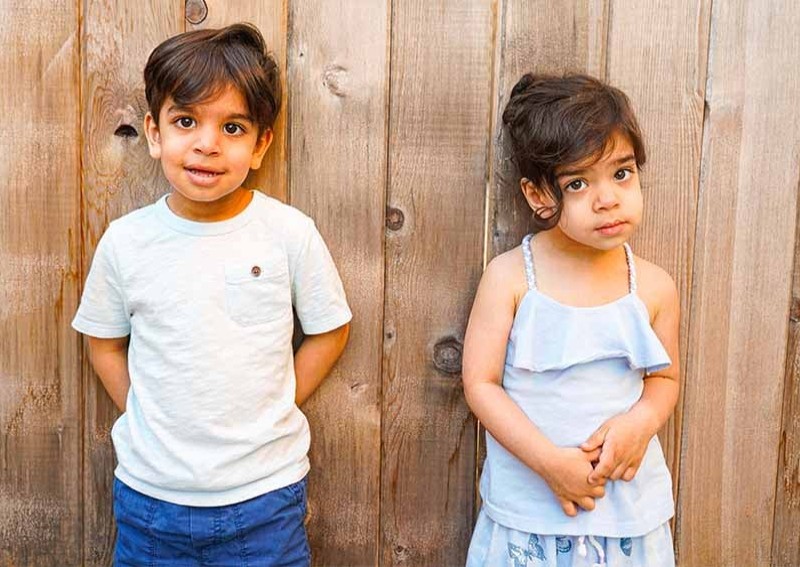Tips for handling sibling rivalry (from a mother of twins)


Sibling rivalry is a given between children in the same household, but imagine it in a house with twins (or other multiples) because of all the constant comparisons that the kids have to put up with all day everyday, especially if they are of the same sex.
No matter the age gap between children, sibling rivalry is usually a given.
But don’t lose hope just yet. On days when you’re tearing out your hair, try these tips to handle sibling rivalry in your home:
As a parent of identical twins, it was a given for me to dress them the same when they were babies.
Not only did I think it made them look really cute (sometimes in exactly the same outfit, or in different colour versions of the same outfit), but it also made shopping for them much easier and less time consuming.
However, in hindsight, I realised that those things were actually fuelling the sibling rivalry between them, as I wasn’t giving their individual identities enough space.
Likewise, turning the smallest of tasks into a competition between them (Let’s see who can find the TV remote the fastest for mommy!) and making them race to get something done when they were toddlers also indirectly fuelled the competition between them, making them "fight" for first place of being the better child.
Likewise, punishing one child in front of the other is also a no-no, as it indirectly shames one child in front of their sibling, putting the "good" child on a pedestal.

Carrying on from the point above, even if you are treating all your children fairly and equally, unconsciously comparing them to each other can create unhealthy competition between them, and diminish their sense of identity, fuelling sibling rivalry.
For instance, having other people compare our young toddler twins was almost a constant for us, as people used to judge them both on their height, weight, development stage, who was talking more than the other, who was "cuter", etc.
Likewise, people (and parents) sometimes also label children unintentionally. For instance, do NOT refer to your child as "he’s the athletic one" or "she’s the smart one", etc, as labels can create separation between siblings, leading to insecurity and jealousy.
Needless to say, I quickly learnt how to tell people off and nip such unhealthy conversations in the bud!
When was the last time either of your toddlers admitted that they started the fight? I can’t remember a single time when either of my boys conceded that he might have been in the wrong.
As infuriating as it is to hear your children constantly squabble over the smallest of things, I learnt that it was very important to spare one ear for each of them, and to let them explain their side (or listen to their imaginative excuses at least).
Together, listen to each of them patiently without interruption or judgement. I found that often, the kids just felt less angry and less insecure after being given the space and time to explain why they were fighting, without fear of being scolded or punished.
And after both of them have spoken, encouraging them to try and understand the fight from their brother’s point of view also helped bury the hatchet between them faster.
I also often found that when the kids took turns explaining their points of view, they usually got side-tracked by an odd comment or detail, started laughing about something completely random and forgot what they were actually arguing about in the first place!
Bonus: seeing the argument from the other person’s point of view helps instil an important life skill in your child that it is possible for two people in the argument to have valid points and that neither of them is completely wrong.

Unless there is a major argument or fight going on (including unacceptable behaviour such as bullying, hitting or biting), stay out of it.
Admittedly, sometimes I just didn’t have the energy or the mental bandwidth to break up yet another toddler argument and I let "the louder twin win".
However on the flip side, by not being a helicopter parent, I found that when left to their own devices, the boys tended to work out the issue themselves in their own way, coming up with a solution together.
Success felt like a shaky house of cards, but for the moment, there was peace in the kingdom till the next battle!
Bonus: Learning how to deal with conflict on their own and calmly is one of the most important life skills that you can instil in your child. I found that as the boys got older, they became closer, as they learnt to resolve small conflicts by talking it out between themselves, without needing anyone to intervene or rescue them.
Balancing work and family time is hard enough already, but it is so important to carve out quality one-on-one time with each child, as is creating special family moments to make positive memories together for the whole family.
Doing something fun together like having a picnic or going to the beach together was enough to help reinforce in both my children that there was enough space for both of them in the family and that they were loved equally by both their parents.
When toddlers play happily together, win in small Children vs Parents games and activities together, it helps them bond better and brings them closer to each other, making them realise that they have a fun sibling and not just someone who constantly irritates them.

It may sound obvious, but young children really do learn more from what they see, rather than from what they hear.
On days when my husband and I had had a (loud) fight or I was just plain irritated, I noticed that the boys were also more on edge and it didn’t take much for them to start quarrelling too. No child should have to be in a home where they are scared of constant screaming matches.
And then on most days where there was more laughter and happier moods, and the kids saw us being more sensitive and respectful to each other’s needs, they too were (a little) nicer to each other, filled with more giggles than more frowns.
It sounds like a cliche, but children are very quick to pick up on your mood and body language, so make it a positive one.
ALSO READ: Teacher troubles: A parent's comprehensive guide to resolving issues
This article was first published in Wonderwall.sg.